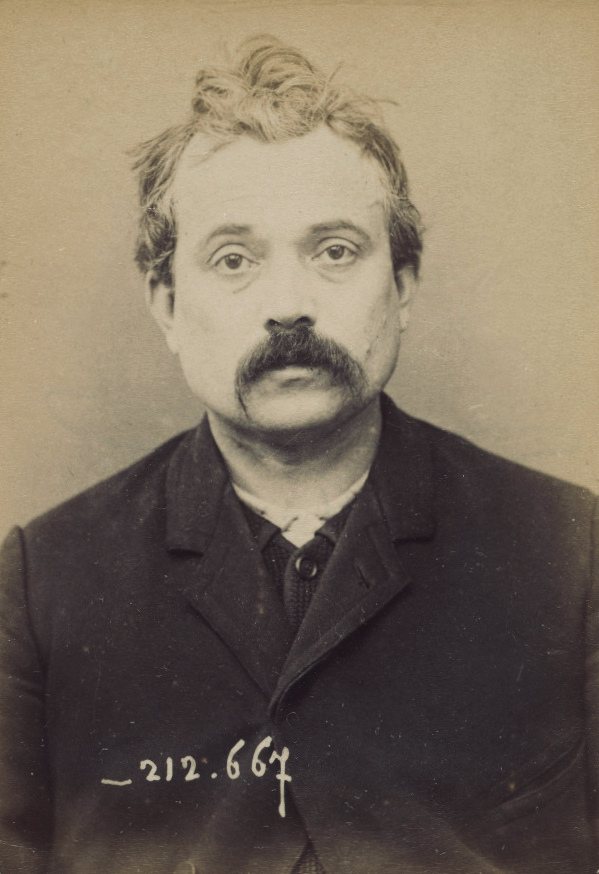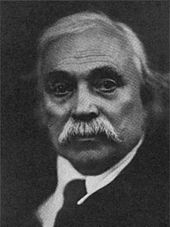Jean Grave
Jean Grave (born October 16, 1854 in Le Breuil-sur-Couze , Puy-de-Dôme department , † December 8, 1939 in Vienne-en-Val , Loiret department ) was a French anarchist and editor of the magazine Les Temps Nouveaux . Due to his lack of talent as a speaker, he rarely appeared in public and was therefore nicknamed "the anarchist Pope" .
Life
Childhood and youth
Jean Grave grew up in a small village in the French Auvergne and spent his childhood in poor circumstances. His father was a miller and ran a small mill in the village. After the family moved to Paris in 1860, he attended a convent school and began an apprenticeship as a mechanic in 1866. As a youth in Paris, Grave experienced the siege of the city and the Paris Commune . In 1874 his mother and sister died of tuberculosis and two years later his father also died. Jean Grave was drafted into the military at the age of 20 and released from military service as an orphan a year later.
Turning to anarchism
Back in Paris, he took up the profession of shoemaker and began to participate in the socialist movement . He founded an anarchist group in 1878 and wrote for the Droit Social magazine in Lyon . Under the pseudonym Jehan le Vagre , he published his first publication La Sociéte au lendemain de la Révolution in 1882 . He was arrested in October of the same year and acquitted a year later in the so-called Lyon trial .
In 1883 Grave moved to Geneva and worked on Élisée Reclus ' magazine Le Révolté . Two years later, the publication of the newspaper was relocated to Paris and renamed La Révolte in 1887 . During this time Grave took over the publication of La Révolte , which became the most important international anarchist magazine, and was responsible for most of the articles. Following the publication of the Viande à Mitraille article about the Fourmies shooting , Grave was sentenced to six months in prison. During his imprisonment he wrote the book La Société Mourante et l'Anarchy ( Eng .: The dying society and the anarchy ), which popularized the anarcho-communist ideas of Kropotkin in France and appeared with a foreword by Octave Mirbeau the following year.
During the era of the 1892-1894 assassinations , Grave's home was raided regularly by police and he was briefly detained a number of times without police finding evidence of his involvement. Due to new laws, the so-called lois scélérates , the publication of La Révolte was made impossible in 1894 and Grave was sentenced to two years in prison and fined 1000 francs for the new edition of La Société Mourante et l'Anarchy . That same year, Grave was indicted in the Thirty Trial but was ultimately acquitted.
Publication of Les Temps Nouveaux

After the newly elected French President Félix Faure issued an amnesty , Grave was released and went to Kropotkin in London , where he met his future wife. Grave decided its own magazine to publish and founded in Paris Les Temps Nouveaux (dt about. The New Times ), whose first issue was published on May 4, 1895. In the magazine he supported the French general Alfred Dreyfus during the Dreyfus affair and worked on this matter with Émile Zola and Bernard Lazare . The publication of the magazine regularly brought Grave into financial difficulties and he lived in relatively poor circumstances. Grave had a close circle of friends with many important artists such as František Kupka , Paul Signac , Maximilien Luce , Théophile-Alexandre Steinlen , Kees van Dongen and Charles Angrand . They always supported the newspaper in the event of financial difficulties and provided the illustrations and drawings for the magazine.
From 1897 onwards, Jean Grave became increasingly interested in libertarian education and started a number of projects. He organized a libertarian summer camp with children and in 1901 wrote the educational novel Les Aventures de Nono (Eng: The Adventures of Nono ), which was very popular in Spanish libertarian schools. However, the founding of his own libertarian school failed.
From the summer of 1898 to the summer of 1899, Grave had to step back and cure an illness on the Côte d'Azur . After his return, he set about organizing the international anarchist congress in Paris in 1900. The congress could not take place due to an official ban. Jean Grave subsequently made some contacts with revolutionary syndicalists , whom he was skeptical of throughout his life. In addition, through his contacts, Jean Grave was the main link between the European anarchist movement and the Japanese and Chinese anarchists.
First World War
The last edition of Les Temps Nouveaux appeared on August 1, 1914 . Due to the mobilization after the outbreak of the First World War , the magazine suddenly lost most of its readers and Grave had to stop publishing for financial reasons.
In the winter Grave went to London because of the war. There he helped to publish La Bataille Syndicaliste and wrote some articles for Freedom . In addition, he published some articles in the Swiss anarchist journal Libre Fédération by Jean Wintsch , which supported the war against the “imperialist” German Reich . As a result, he was also instrumental in the constitution of the Manifesto of the Sixteen , which campaigned for the support of the Allies in the First World War. Many anarchists attacked the manifesto and Grave and the other signatories found themselves increasingly isolated in their attitudes.
Withdrawal and death
Meanwhile, a group in Paris took over the editing of Les Temps Nouveaux again. From 1919, however, she appeared after a dispute between the group and Jean Grave without his assistance until 1921. Due to a heart condition, Grave had to largely give up his activities and he withdrew. In 1930, part of his memoirs appeared under the name Le Mouvement libertaire sous la Troisième République and was only published in full posthumously in 1973. Grave died in Vienne-en-Val on December 8, 1939 at the age of 85.
Works
- La Société au lendemain de la Révolution . 1882.
- Organization de la propagande révolutionnaire . 1883.
- Autorité et organization . 1885.
- La Révolution et l'autonomie selon la science . 1885.
- La Société Mourante et l'Anarchy . 1892.
- La Société Future . 1895.
- La Grande Famille . 1896.
- L'Individu et la Société . 1897.
- Le machinisme . 1898.
- La panacée revolution . 1898.
- L'Anarchy, son but, ses moyens . 1899.
- La colonization . 1900.
- Enseignement bourgeois et enseignement libertaire . 1900.
- Les Aventures de Nono . 1901.
- Organization, initiative, cohesion . 1902.
- Malfaiteurs! 1903.
- Responsibility! (Play) 1904.
- Le syndicalisme dans l'évolution sociale . 1908.
- Terre Libre . 1908.
- Si j'avais à parler aux électeurs . 1912.
- Les scientifiques et Contre la folie des armements . 1913.
- Quarante ans de propagande anarchiste . Flammarion, Paris 1973.
literature
- Jean Maitron: Le mouvement anarchiste en France . Paris 1975.
Web links
- Biography of Jean Grave (fr.)
| personal data | |
|---|---|
| SURNAME | Grave, Jean |
| BRIEF DESCRIPTION | French anarchist |
| DATE OF BIRTH | October 16, 1854 |
| PLACE OF BIRTH | Le Breuil-sur-Couze , Puy-de-Dôme department |
| DATE OF DEATH | December 8, 1939 |
| Place of death | Vienne-en-Val , Loiret department |



